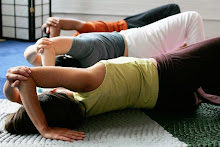Recently I had the opportunity to revisit an interview of Moshe Feldenkrais on the subject of actor training and the benefits for actors in the Feldenkrais Method. And it got me to thinking -- how people of wide varieties of interests can benefit from these insights directed at actors. With the supremacy of specialization, we are highly likely to become trapped in the echo chamber of ideas that are virtually identical to our own. When I find something useful from another field, it brings a breath of fresh air to my own. (A link to the interview appears at the end of this post.)
And so -- one aspect that Dr. Feldenkrais and the interviewers discussed was the idea of relaxation. You may be familiar with the notion from athletics, acting, or music that the performer must "stay loose" or relaxed. We all know that we probably need to stress less, and well-meaning advice comes from all quarters to "relax." Yet, we know less and less how to do that!
We also view relaxation and stress as a binary, all-or-nothing function. We picture the caffeine-crazed, hair-standing-on-end, wide-eyed, wound-up, in-pain version of ourselves. The only alternative we can imagine is the semi-conscious puddle of goo, the wet noodle, the about-to-fall-asleep self. Feldenkrais draws some useful distinctions.
As Feldenkrais observes in the interview, the state of total relaxation is not very useful -- unless you are trying to fall asleep! If you were "totally relaxed," you wouldn't have enough get-up-and-go to accomplish anything. The Feldenkrais Method helps people to discover something he called "eutony:" the capacity to sense, with comfortable precision, the appropriate amount of muscular effort needed to accomplish a desired action. The undesirable choice between "Burn Out" or "Rust Out" is expanded into a much more practical and diverse spectrum of virtually limitless options.
Eutony, then, is something you recognize when you experience it. It actually feels -- GOOD. You might need some practice to find new choices for yourself, other than StressGirl or NoodleBoy. That's what our classes and lessons in the Feldenkrais Method are for. You'll find your own right combination of action, attention, and ease that makes all aspects of your life more enjoyable and sustainable.
Read the article, "Image, Movement and Actor: Restoration of Potentiality," a discussion of the Feldenkrais Method and Acting, Self-Expression and the Theater here.

![Reblog this post [with Zemanta]](http://img.zemanta.com/reblog_e.png?x-id=a8ccc4e1-fd20-470c-8b87-24034a5f302f)

![Reblog this post [with Zemanta]](http://img.zemanta.com/reblog_e.png?x-id=924da09a-0698-4854-9ba9-796112de7b7a)

